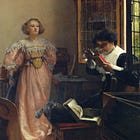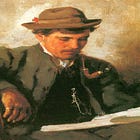Writing to Learn (II)
This time I actually read the book
A week or so after I hit ‘continue’ on my precocious pseudo-review of William Zinsser’s Writing to Learn, an honest-to-goodness ink-and-paper copy of the book appeared in my mailbox. So, after indulging in a short (but heartfelt) Snoopy dance, I went down to the river to read, in the sunniest spot I could find, the object of my anticipatory affection.
My most recent experiment in ‘writing to learn’ had taken the form of my very first paean to the work of a musician. Thus, in honor of that highly instructive experience, I began my engagement with Writing to Learn by jumping into an essay called ‘Worlds of Music’.
This title suggested that the chapter, the last of twelve in this little book, would explain how euphonic neophytes like myself might, pen in hand, blaze a trail into Calliope’s realm. However, instead of providing directions of that sort, Mr. Zinsser treated me to the story of an especially insightful piano teacher who laid a solid foundation for the expertise that, half of a lifetime later, would enable him to wax rhapsodic on the subject of jazz.
In and of itself, the tale of wise Editha Messer teaching little Billy Zinsser the art of playing by ear possessed a certain charm. The message it sent, however, undermined the premise promised by the title of Writing to Learn. Rather than explaining how the act of composing essays helps people make sense of matters new to them, ‘Worlds of Music’ told me that if I wished to write about a subject I needed both an extraordinary teacher who custom-tailored her lessons to my peculiar talents and several decades worth of experience.
Once I recovered from this little exercise in bookish ‘bait and switch’, I dove into the chapter that bore the same name as the work as a whole. Alas, this second essay had no more to do with the advertised subject of Writing to Learn than the first.
Based on discussions with professors who taught chemistry, geography, economics, history, and nursing at a college in Minnesota, ‘writing to learn’ had nothing to do with the spilling of ink for the sake of specialized knowledge. Instead, it celebrated the addition of instruction in English composition to the courses those teachers taught. In other words, Zinsser could easily have called the chapter ‘Writing to Learn … about Writing’.
At this point, I should explain that I applaud the sacrifice of specialized instruction on the altar of clear and cogent composition. After all, an alumnus at home with expository prose offers more to an employer, and society at large, than one who can parrot a particular professor’s peculiar insights into the oeuvre of Marcel Proust. Indeed, my frustration with the misleading title of ‘Writing to Learn’ owes less to its blatant violation of the Trade Descriptions Act of 1968 than Zinsser’s failure to showcase a point that ought to be written, in letters of fire, on the blackboard of every college classroom in the English-speaking world.
On a happier note, the third chapter of Writing to Learn that I embraced honored the check written by its name. Called ‘Writing Mathematics’, it took the form of an interview with Joan Countryman, a high-school math teacher who, marvelous to say, encouraged her students to write about things like numbers with thirteen factors and the purpose of calculus. (Where were you, Mrs. Countryman, when I tried to learn algebra from a mumbling, bumbling disciple of Leon Trotsky who devoted each class to the scribbling of equations that no one else in the room could see?)
Unfortunately, the remaining chapters of Writing to Learn failed to live up to the standard set by ‘Writing Mathematics’. In particular, rather than describing ways in which learners, self-directed or otherwise, used writing to explore strange new worlds, they recounted encounters with books that, and authors who, did a laudable job of explaining things like chemistry, geology, physics, and the meanings to be gleaned from famous paintings.
So, Gentle Reader, if you want to read about the well-written non-fiction books that William Zinsser read forty years ago or a great deal about that author’s life, pick up a copy of Writing to Learn. (I got mine for, as the podcasters like to say, ‘less than the price of a latte’.) If, however, you want to learn about writing to learn, go to your local library, and make yourself a copy of the nineteen pages of ‘Writing Mathematics’, and return the mistitled volume to its place on the shelf.
For Further Reading:
To Share, Subscribe, or Support:






I too saw the YouTube video in mid-April and ordered the book. I too marvelled at how misleading the title was (I got to p.98 before seeing this post then immediately reading the chapter on Joan Countryman).
Zinsser's greatest crime might be stealing the perfect title for a book that really should be written. Chapter 9 barely scratches the surface.